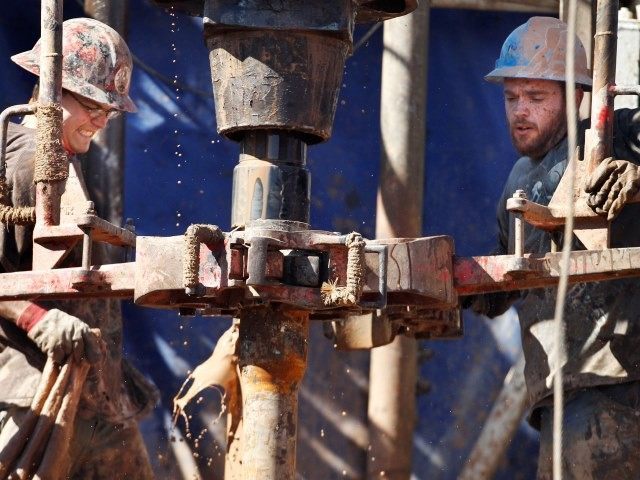The continuing drop in oil prices is negatively affecting tax revenues and economic numbers in Texas.
Texas Comptroller of Public Accounts Glenn Hegar reports that oil and natural gas tax collections for the first four months of RY 2016, which began in September 2015, are down by 49 percent from the same period in FY 2015. Sales tax revenues for the state are also down, but not as much. For the first four months of FY 2016, state sales tax collections were down by 2.098 percent. December alone made up 1.03 percent of that decrease in collections. These figures are from the Comptroller’s Texas Economy website.
While the drop in oil prices is having a marked impact on the Texas economy, sectors beyond oil and gas are helping Texas continue its growth, albeit at a smaller than anticipated rate. Hegar reported that 9 of the 11 major industries in Texas showed job growth. Those industries include: professional and business services, trade, transportation and utilities, leisure and hospitality, education and health services, construction, government, financial activities, information, and other services.
For the first time in 108 consecutive months, Texas rate of unemployment fell behind that of the national average. Texas’ unemployment rate for December 2015 was 4.7 percent compared to the national average of 4.6 percent.
On the positive side, massive growth in the state’s population has led to a massive growth in new home construction, particularly in the area of multi-family homes that new residents of Texas are seeking to begin their restart in life. Multi-family building permits increased by 4.28 percent during a 12-month period that ended in November 2015. However, November 2015 permits alone represented an increase of 38.38 percent over November 2014 permits. Single family homes increased by 3.37 percent during that same 12-month period.
While the lower price of oil has certainly negatively impacted growth in the oil and gas sector of the Texas economy, other areas of the state’s economy may well benefit from lower fuel prices. The reduced cost of transporting products could see lower retail prices of products and an increase in retail sales. Lower fuel prices would also cut travel costs allowing growth in business travel and tourism.
Business Insider reported lower fuel prices will have positive impacts on the more advanced economies of the world. “Their consumers and a notable part of their industrial base will have the possibility – if not probability – of translating their windfall gains into higher economic activity,” Business Insider contributor Mohamed A. El-Erian reported. “And this could well be significant … that is provided the short-term transition challenges are managed well.
Those transitions include what El-Erian referred to as the “low-flation” impact of falling fuel and retail prices. “The challenge of “low-flation” in the United States is amplified by an outright threat dis-inflation threat in Europe,” he wrote. “As Mario Draghi, the President of the European Central Bank, re-iterated last week, European policymakers are worried that the sharp oil price fall will accentuate deflationary forces and entice consumers to postpone purchases in anticipation of even lower prices in future.”
“The result is a bout of financial instability as markets transition from a low volatility regime due to effective central bank policy repression, to one of higher volatility whose impact is amplified by pockets of market illiquidity,” El-Erian wrote.
From a different viewpoint, Business Insider’s Akin Oyedele said that “Only America can save the oil market.”
Looking at the short term, Oyedele said that oil prices spiked upwards late last week and increased by 25 percent, a small glimmer of hope from the 70 percent fall from the previous high in June 2014.
Oyedele surmised that lower oil prices will squash U.S. oil production over the next year will reverse the flood oil being supplied and create higher demand. He quoted Citigroup’s Ed Morse as saying, “America can come to the rescue by reversing the supply imbalance that led to the oil crash.”
“Unless material production declines emerge in the next 3-6 months it is hard to see much upside in crude prices,” Morse wrote in a note to a client that was reported by Business Insider. He said the biggest hit in supply will come from the more expensive shale oil production. “This therefore leaves the largest burden of balancing global oil markets on US oil production, and the combination of stripper well declines, reduced shale production stemming from lower drilling activity and even perhaps reduced completions at sub-$30/bbl oil, should lead to material declines in 2016. In this three-way game of chicken between OPEC, shale, and non-OPEC non-shale producers, only shale has blinked so far. This is confirming its role as a key marginal producer that acts most quickly to curtail drilling activity in response to low oil prices.”
And, of course, shale production has been a big part of the Texas recovery over the past several years. Cuts in shale production would have impact on state’s that have been relying on that growth, like Texas and North Dakota.
“The marginal high-cost producers — North American hydrofrackers — are being wiped out slowly but surely,” Money.net CEO Morgan Downey stated. “And that will cause, of course, the recovery in oil prices over the next year or year and a half back up over 50.”
Morse concluded, “In this three-way game of chicken between OPEC, shale, and non-OPEC non-shale producers, only shale has blinked so far. This is confirming its role as a key marginal producer that acts most quickly to curtail drilling activity in response to low oil prices.”
Bob Price serves as associate editor and senior political news contributor for Breitbart Texas and is a member of the original Breitbart Texas team. Follow him on Twitter@BobPriceBBTX.

COMMENTS
Please let us know if you're having issues with commenting.